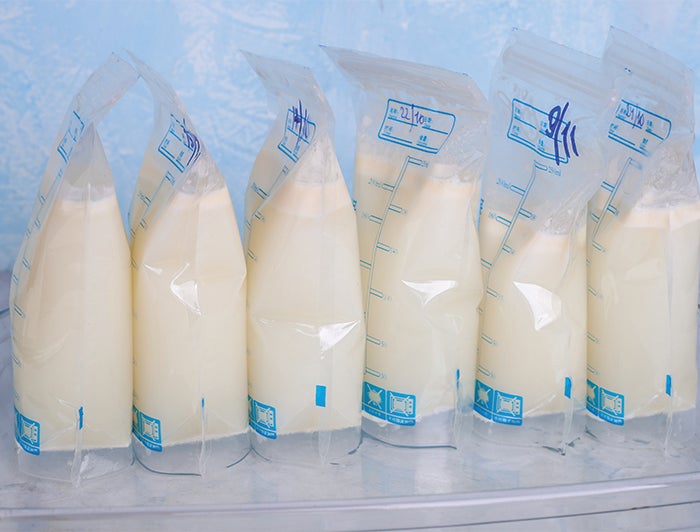Arkansas Children’s Hospital opens the state’s first human milk bank to care for its most vulnerable patients

Arkansas’ first human milk bank benefiting neonatal intensive care units (NICUs) in the state opened Sept. 6, 2023, as a partnership with Arkansas Children’s Hospital (ACH) and the University of Arkansas for Medical Sciences (UAMS).
A human breast milk donation bank, often simply referred to as a milk bank, collects, screens, processes and distributes donated human breast milk to infants in need. These banks play a crucial role in supporting the health and well-being of vulnerable infants, particularly premature or sick babies who may have difficulty breastfeeding or receiving an adequate supply of milk from their mothers.
The new milk bank will distribute donated milk to the roughly 20 level two and three NICUs in the state and some term nurseries in hospitals. Term nurseries use donor milk to help moms who want to breastfeed exclusively but do not have enough milk to feed their babies at birth. In the future, the bank may distribute donor milk to the community. Arkansas Children’s Hospital has the only level 4 NICU in the state.
“There’s an extensive donor screening process to ensure the milk is safe, that mom and baby are healthy, and that their milk is good for premature babies,” said Misty Virmani, M.D., a neonatologist at ACH and associate professor at UAMS and director of the milk bank on the UAMS campus.
Previously, the Arkansas Children’s NICU received its supply of donor milk from Texas or Oklahoma. States prioritize their residents first, so they will not donate to Arkansas if their supplies are low.
NICU babies need donor milk when the parent cannot express or produce enough or if a mother’s milk is not safe for the baby because of a medical condition or medications. Any baby less than 34 weeks at delivery qualifies for human donor milk. The Arkansas Children’s NICU prioritizes feeding parental milk (mother’s milk) if available. Still, roughly 50% of babies at the NICU receive donor milk at some point during their hospital stay.
According to 2017 Centers for Disease Control and Prevention data, Arkansas is ranked second highest in the nation for infant mortality, or babies who die before they turn one. That equates to 8.2 deaths per 1,000 live births, or more than 300 infants per year.
For premature infants globally, having parental or donated human milk for their primary feedings reduces the risk of developing necrotizing enterocolitis (NEC), an inflammation of the intestinal tissue which can cause some of the intestine to die or create a hole that can cause bacteria and intestinal contents to leak into the abdomen or the bloodstream. Human milk, particularly a mother’s own milk, reduces the risk of several health conditions, including sepsis, chronic lung disease, sudden infant death syndrome (SIDS) and blindness.
According to Arkansas Children’s neonatologists, the milk bank and creating a center for breastfeeding support and education in the state will save lives. Human milk globally reduces infant mortality by 21%.
“It is a massive decrease,” Virmani said. “When you think about Arkansas being one of the highest infant mortality rates in the U.S., it can have a huge impact on better supporting the mothers and babies in our state. It will reduce infant mortality in Arkansas.”

